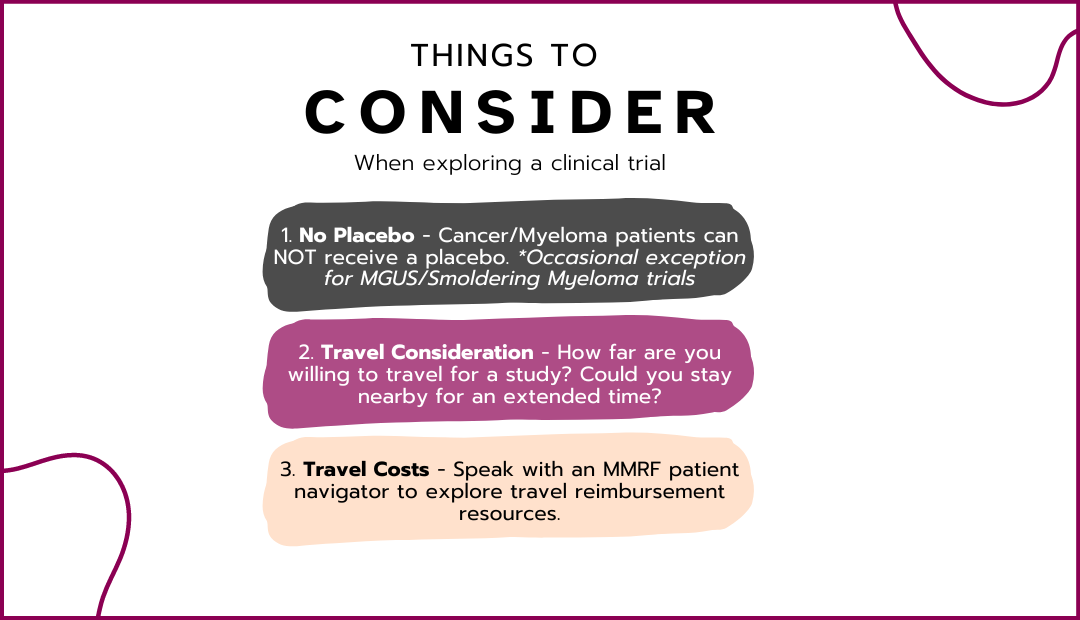Combination Therapy (Mirdametinib and Sirolimus) for RAS Mutated Relapsed Refractory Multiple Myeloma
NCT06876142
Age 18 - 120
Sex Both
Phase Phase 1, Phase 2
Third Opinion Trial Synopsis
In this clinical study, researchers are exploring a new treatment approach for patients with a specific type of blood cancer. The study focuses on combining different therapies to see how well they work together. This approach is unique because it looks at multiple treatment options at once, rather than just one at a time. Here are some key details about the study:
- The study involves a combination of therapies that target the cancer in different ways, potentially leading to better outcomes for patients.
- Participants will receive treatments that are designed to work together, which may enhance their effectiveness compared to standard treatments.
- The study aims to evaluate how well these combined therapies can help manage the disease and improve patients' quality of life.
- Researchers will closely monitor participants for any side effects and overall health improvements throughout the study.
- This study is being conducted at multiple locations, allowing a diverse group of patients to participate and contribute to the findings.
Third Opinion AI Generated Synopsis
Trial Summary
Background: Multiple myeloma (MM) is a type of blood cancer that affects a person s immunity. MM returns after treatment (relapse) in almost all people; MM may also not respond to initial treatment (refractory). Many people with relapsed refractory MM (RRMM) also have changes in their KRAS and NRAS genes. Researchers want to try a new drug treatment that targets cancer with these changed genes. Objective: To test 2 drugs (mirdametinib and sirolimus) in people with RRMM. Eligibility: People aged 18 and older with RRMM who have changes in their KRAS or NRAS genes. Design: Participants will be screened. They will have blood tests and imaging scans. They will have an eye exam and a test of their heart function. They will need to provide proof of their disease status and of their KRAS or NRAS status. If neither is available, the tests will be repeated. Participants will have a bone marrow biopsy: A needle will be inserted into a hipbone to draw out some soft tissue. This study will be done in two parts. In the first part of this study, we will find a safe dose of mirdametinib combined with sirolimus. In the second part, we will learn more about how mirdametinib combined with sirolimus may work against RRMM. Mirdametinib (capsules) and sirolimus (tablets) are taken by mouth. Participants will take both drugs at home on a 4-week cycle. They will take mirdametinib twice a day for the first 3 weeks of each cycle. They will take sirolimus once a day, every day, during each cycle. Participants will have study visits once a week during the first cycle, and then on the first day of subsequent cycles. Blood, heart, imaging scans, and other tests will be repeated. Treatment with the study drugs will go on for 1 year. Then participants will have follow-up visits every 3 months for 4 more years.
Background: Multiple myeloma (MM) is a type of blood cancer that affects a person s immunity. MM returns after treatment (relapse) in almost all people; MM may also not respond to initial treatment (refractory). Many people with relapsed refractory MM (RRMM) also have changes in their KRAS and NRAS genes. Researchers want to try a new drug treatment that targets cancer with these changed genes. Objective: To test 2 drugs (mirdametinib and sirolimus) in people with RRMM. Eligibility: People aged 18 and older with RRMM who have changes in their KRAS or NRAS genes. Design: Participants will be screened. They will have blood tests and imaging scans. They will have an eye exam and a test of their heart function. They will need to provide proof of their disease status and of their KRAS or NRAS status. If neither is available, the tests will be repeated. Participants will have a bone marrow biopsy: A needle will be inserted into a hipbone to draw out some soft tissue. This study will be done in two parts. In the first part of this study, we will find a safe dose of mirdametinib combined with sirolimus. In the second part, we will learn more about how mirdametinib combined with sirolimus may work against RRMM. Mirdametinib (capsules) and sirolimus (tablets) are taken by mouth. Participants will take both drugs at home on a 4-week cycle. They will take mirdametinib twice a day for the first 3 weeks of each cycle. They will take sirolimus once a day, every day, during each cycle. Participants will have study visits once a week during the first cycle, and then on the first day of subsequent cycles. Blood, heart, imaging scans, and other tests will be repeated. Treatment with the study drugs will go on for 1 year. Then participants will have follow-up visits every 3 months for 4 more years.
from ClinicalTrials.gov
Locations & Contact
Fill out the form and to let the Multiple Myeloma Research Foundation know you are interested in this trial.
Contacts:

